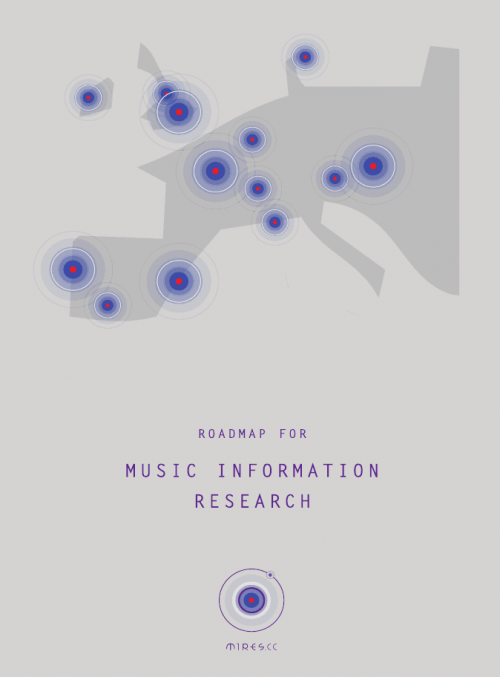About Roadmap
From MIReS
This document proposes a Roadmap for Music Information Research with the aim to expand the context of this research field from the perspectives of technological advances, user behaviour, social and cultural aspects, and exploitation methods. The Roadmap embraces the themes of multimodality, multidisciplinarity and multiculturalism, and promotes ideas of personalisation, interpretation, embodiment, findability and community.
From the perspective of technological advances, the Roadmap defines Music Information Research as a research field which focuses on the processing of digital data related to music, including gathering and organisation of machine-readable musical data, development of data representations, and methodologies to process and understand that data. More specifically, this section of the Roadmap examines (i) musically relevant data; (ii) music representations; (iii) data processing methodologies; (iv) knowledge-driven methodologies; (v) estimation of elements related to musical concepts; and (vi) evaluation methodologies. A series of challenges are identified, related to each of these research subjects, including: (i) identifying all relevant types of data sources describing music, ensuring quality of data, and addressing legal and ethical issues concerning data; (ii) investigating more meaningful features and representations, unifying formats and extending the scope of ontologies; (iii) enabling cross-disciplinary transfer of methodologies, integrating multiple modalities of data, and adopting recent machine learning techniques; (iv) integrating insights from relevant disciplines, incorporating musicological knowledge and strengthening links to music psychology and neurology; (v) separating the various sources of an audio signal, developing style-specific musical representations and considering non-Western notation systems; (vi) promoting best practice evaluation methodology, defining meaningful evaluation methodologies and targeting long-term sustainability of MIR. Further challenges can be found by referring to the "Specific Challenges" section under each subject in the Roadmap.
In terms of user behaviour, the Roadmap addresses the user perspective, both in order to understand the user roles within the music communication chain and to develop technologies for the interaction of these users with music data. User behaviour is examined by identifying the types of users related to listening, performing or creating music. User interaction is analysed by addressing established Human Computer Interaction methodologies, and novel methods of Tangible and Tabletop Interaction. Challenges derived from these investigations include analysing user needs and behaviour carefully, identifying new user roles related to music activities; developing tools and open systems which automatically adapt to the user; designing MIR-based systems more holistically; addressing collaborative, co-creative and sharing multi-user applications, and expanding MIR interaction beyond the multi-touch paradigm.
Social and cultural aspects define music as a social phenomenon centering on communication and on the context in which music is created. Within this context, Music Information Research aims at processing musical data that captures the social and cultural context and at developing data processing methodologies with which to model the whole musical phenomenon. The Roadmap analyses specifically music-related collective influences, trends and behaviours, and multiculturalism. Identified challenges include promoting methodologies for modeling music-related social and collective behavior, adapting complex networks and dynamic systems, analysing interaction and activity in social music networks, identifying music cultures that can be studied from a data driven perspective, gathering culturally relevant data for different music cultures, and identifying specific music characteristics for each culture.
The exploitation perspective considers Music Information Research as relevant for producing exploitable technologies for organising, discovering, retrieving, delivering, and tracking information related to music, in order to enable improved user experience and commercially viable applications and services for digital media stakeholders. This section of the Roadmap focuses specifically on music distribution applications, creative tools, and other exploitation areas such as applications in musicology, digital libraries, education and eHealth. Challenges include demonstrating better exploitation possibilities of MIR technologies, developing systems that go beyond recommendation and towards discovery, developing music similarity methods for particular applications and contexts, developing methodologies of MIR for artistic applications, developing real-time MIR tools for performance, developing creative tools for commercial environments, producing descriptors based on musicological concepts, facilitating seamless access to distributed data in digital libraries, overcoming barriers to uptake of technology in music pedagogy and expanding the scope of MIR applications in eHealth. For a full list of challenges, please refer to the relevant sections of the Roadmap.
The Music Information Research Roadmap thus identifies current opportunities and challenges and reflects a variety of stakeholder views, in order to inspire novel research directions for the MIR community, and further inform policy makers in establishing key future funding strategies for this expanding research field.
People
The MIReS Consortium
- Music Technology Group (MTG), Universitat Pompeu Fabra, Barcelona, Spain
- Stromatolite Design Lab
- Austrian Research Institute for Artificial Intelligence (OFAI) of the Austrian Society for Cybernetic Studies, Vienna, Austria
- Instituto de Engenharia de Sistemas e Computadores (INESCP TEC), Porto, Portugal
- Institut de Recherche et Coordination Acoustique et Musique (IRCAM), Paris, France
- Centre for Digital Music (C4DM), Queen Mary University of London, UK
- Barcelona Music and Audio Technologies (BMAT), Barcelona, Spain
| Coordinators | Michela Magas
Xavier Serra
|
| Main Contributors | Emilia Gomez (MTG)
Perfecto Herrera (MTG) Sergi Jordà (MTG) Xavier Serra (MTG)
Jan Schlüter (OFAI) Gerhard Widmer (OFAI)
Hugues Vinet (IRCAM)
Magdalena Chudy (C4DM) Simon Dixon (C4DM)
|
| Additional Contributors | Marcus Schedl (Johannes Kepler
University, Linz)
Jaume Vintró (BMAT) |
Please cite this document as:
Xavier Serra, Michela Magas, Emmanouil Benetos, Magdalena Chudy, Simon Dixon, Arthur Flexer, Emilia Gómez, Fabien Gouyon, Perfecto Herrera, Sergi Jordà, Oscar Paytuvi, Geoffroy Peeters, Jan Schlüter, Hugues Vinet, Gerhard Widmer, "Roadmap for Music Information ReSearch", Geoffroy Peeters (editor), 2013, Creative Commons BY-NC-ND 3.0 license, ISBN: 978-2-9540351-1-6

